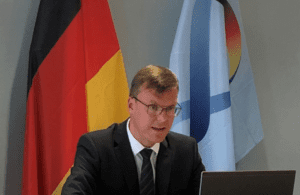by Dr. Peter Stubbe
 Public funding remains key for the space sector, in particular when it is about catalyzing the emerging new space sector. What is the German philosophy and which tools are you using?
Public funding remains key for the space sector, in particular when it is about catalyzing the emerging new space sector. What is the German philosophy and which tools are you using?
The space sector is undergoing a significant shift: “New Space” comes along a re-balancing of the roles of the public and the private sector and the way they interact with each other: The public side increasingly relies on industry to provide certain services rather than procuring and operating satellites itself. In addition, there is an increasing number of private actors in space and more private money is being invested. The growth of the sector as a whole is driven more and more by private rather than public money. In this context, more programmes focus on supporting and stimulating space commercialization. The ESA support programme for small launchers developments, newly introduced in 2019, is a case in point.
Germany is traditionally favoring market-centered policy approaches, emphasizing the need to set the right conditions for stimulating growth and reducing public interventions. This is true for the space sector, too, even more so in a New Space context. The focus is to support and strengthen innovation and commercialization in order for the industry to suceed in domestic, European and international markets.
What’s the state of play in Europe?

We have very well advanced in setting up the right European space programmes. This is not only true for the ESA side: Space19+ has laid the ground for many new activities, and preparations for the upcoming Ministerial Council in 2022 are about to start. In addition, also the preparation for the new EU Space Programme has taken a huge step forward. The week of 14 Dec 2020, the European institutions – the Council, the European Parliament and the European Commission – have politically agreed on all outstanding issues of the programme regulation. This paves the way for its finalization and the launch of the programme, including Copernicus and Galileo, early next year. (Link to the Agreement on European Space Programme here)
However, the success of European space does not only depend on the public programmes alone. There are opportunities for industry beyond that. In fact, we observe an increasing growth of the global space economy throughout the entire range of space applications and systems. Its value is estimate to amount to more than 350 billon USD and will continue to grow significantly. So, we have to ask ourselves: What do we need to do in order to allow European industry benefit from this global dynamic?
The German EU Presidency has taken up the issue and included it as a priority item for the EU-ESA Space Council in November. What is the background and which success did the initiative have?
Indeed, the German EU Presidency decided to put this question on the agenda of European space policy and proposed the following answer: Europe needs to be more ambitious by seizing the opportunities that the global space economy offers. Today more than ever before, space activities have become interdependent, not only in terms of operations and sustainable space operations, but also with regard to international value chains and trade in space products. They have viable become commodities and the space sector has turned into a mature market.
For Europe to be successful and to participate in the expanding growth opportunities, there needs to be a level playing field for the global space economy. This relates to a wide range of topics, including fair conditions for market access, space traffic management, access to financing as well as the protection of intellectual property rights and cyber security. All of these issues have a bearing on the success of European industry worldwide. That is why it is important that Europe finds positions on these issues and contributes to key principles for the global space economy. Adding a strong European voice to international debates will help preserving European interests.
This was the message of the orientations adopted by the EU-ESA Space Council in November. The format integrates all relevant actors in European space affairs – the EU, ESA and the respective Member States – and has proven again its relevance for providing essential guidance for the overall European space policy.
According to the conclusions adopted by the Space Council, European space ministers emphasize the benefit of asset-based financing. Can you explain what that is?
Yes, securing access to space financing is one of the key items that was addressed by the Space Council. The New Space comes along with the emergence of new companies entering the scene, in particular small and medium sized enterprises and space start-ups. They require access to additional funding in order to develop their businesses. There are venture capital and angel investors, especially in the United States. The Space Council underlined the political relevance of promoting financing opportunities also in Europe.
We need to look to novel financing instruments to this effect. This is exactly what Ministers had in mind when demanding a boost for asset-based: It has the potential for reducing financing costs significantly. Asset-based financing means that space assets such as transponders or entire satellites can be offered as valuable securities to creditors for their loans. The UNIDROIT Space Protocol was adopted in 2012 and introduces an international interest in the space assets in order reduce financing costs for the creditors enhance attractive financing products for the credit receivers.
So far, the UNIDROIT Space Assets Protocol has not received broad support, only four countries have signed the instrument. In fact, the instrument has also been met with criticism. What are the points that are criticized and what are the reasons?
By the time of the development of the Space Protocol, the space sector was largely dominated by the classic actors on public and private side. As this picture has recently changed significantly, the interest in novel instruments for space financing is equally increasing. Traditional operators of large satellite fleets usually have sufficient access to financing. The picture is different for smaller companies and new market entrants: For them, asset-based financing would provide interesting opportunities. Financing industry has always been very much interested in novel instruments. With the emergence of New Space, the space sector is now becoming much more responsive to these new options. In a sense, one can say that the Space Protocol was ahead of its time.
A more technical reason for the low status of ratifications is that a dedicated EU action is needed before EU Member States can sign or ratify the Space Protocol. In particular in view of the increased relevance of asset-based financing and the push from the Space Council, an EU signature of the Protocol should become more relevant as well.
How will the Covid-19 pandemic influence access to space financing and the broader space sector?
Covid-19 is a challenge for all areas of our societies and economies. This also applies to the space sector. The German EU Presidency initiative for enhancing access to global markets also serves as a means for post-Covid recovery of European space industry. In addition, the recovery and resilience plans that are currently being set up and implemented at the national level as well as the broader measures under the Next Generation EU budget give room for investments also in the space which contributes to developing the sector also in times of crisis. initiative for establishing key principles for the global space economy.
What will the change of the government and administration in the U.S. mean for the partnership with Europe, the cooperation and the priorities, as far as you can tell now?
For Europe, the United States is the key partner for cooperation in space. To what extent the upcoming change in government will result in changes in the US space policy remains to be seen. The present Administration in December 2020 issued a revised National Space Policy as well as Space Policy Directive no. 6 on nuclear power sources.
One immediate consequence of the election results was that Jim Bridenstine announced he would resign as NASA Administrator in January 2021. We may also see shifting priorities, possibly slowing down the Artemis programme for human exploration and enhancing Earth science activities, including for climate change monitoring. After all, Europe will continue to rely on the US partner in space cooperation bilaterally as well as in multilateral settings.

Dr. Peter Stubbe is Head of the EU Affairs Department at the DLR Space Administration since November 2020. Before, he worked in the Space Policy Department of the German Ministry of Economic Affairs and Energy and focused on preparing and implementing the German EU Council Presidency, i.a. as the Vice-Chair of the Space Working Party of the EU Council





